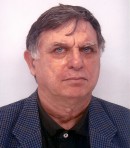
Plenary Lecture
Evolutionary Multiobjective Optimization Algorithms toEnvironmental Management and Planning

Professor Andre A. Keller
Laboratoire d'Informatique Fondamentale de Lille/SMAC, UMR 8019/CNRS
Universite de Lille Nord de France
France
E-mail: Andre.Keller@univ-lille1.fr
Abstract: Environmental management and planning problems cover important real lifeareas. These problems may includethe scarcity of groundwater resource, the optimality of a multireservoirsystem,the management of forestresources, the air quality monitoring networks, the municipal solid wastepolicies. Management and planning targets by authorities consist in allocations at appropriate places and times, protection from disasters, .maintenance of quality (e.g. water quality, water pollution control, nitrate concentration diminishing), sustainable development of the groundwater resources.
The formalization of such optimization problems includes multiple objectives and constraints. The multiple objectives consist in maximizing/minimizing of various aspects of environmental management, e.g. .maximizing of irrigation releases, maximizing the hydropower production, maximizing net returns, minimizing costs, minimizing the investment in water development, minimizing groundwater quality deterioration, etc.. Physical, biological, economic and environmental constraints are e. g; constraint of surface water balance, water supply constraints, water quality constraints, economic constraints (demand, resource costs, etc.) reservoir storage constraints.The eco-environmental objectivesare often conflicting (e.g. the optimum use of water resources under conflicting demands):The use of multiobjective optimization allows a simultaneous treatment of all the objectives and constraints. The solutions take the form of non-dominated Pareto solutions, which enable the decision makers to study the tradeoffs between the objectives(e.g. between profitability and risks).
Most of the environmental domains are faced to uncertainties due to variability (e.g. climate, rainfalls, hydrologic variability, environmental policy, markets, etc.), imprecision and lack of data, vagueness of judgments by decision makers. These uncertaintiesleadto extendedthe analysis to fuzzy environments. This presentation is then concerned with decision-making methods in environmental management and planning, where multiple objectives may be conflicting . Evolutionary multiobjective optimization techniques (e.g. niched Pareto genetic algorithm) are used under a fuzzy environment.
Brief Biography of the Speaker: Andre A. Keller (Prof.) is at present an associate researcher from the “Multi-agent Systems and Behaviors” division of LIFL (Lille Fundamental Computer Science Laboratory), a research unit UMR8022 of the French Centre National de la Recherche Scientifique (CNRS) by the Universite de Lille 1, Sciences et Technologies. He received a PhD in Economics (Operations Research) in 1977 from the Universite de Paris Pantheon-Sorbonne. He is a WSEAS Member since 2010 and a Reviewer for the ELSEVIER journal Ecological Modelling, the Journal Mathematical Analysis and Applications (jmaa) and WSEAS Transactions on Information Science and Applications. He taught applied mathematics (optimization techniques) and econometric modeling, microeconomics, theory of games and dynamic macroeconomic analysis. His experience centers are on building and analyzing large scale macro-economic models, as well as simulating economic policies, and forecasting. His research interest has concentrated on: high frequency time-series modeling with application to the foreign exchange market, on discrete mathematics (graph theory), stochastic differential games and tournaments, circuit analysis, optimal control in a fuzzy context. His publications consist in writing articles, books and book chapters. The book chapters are e.g. on semi-reduced forms (Martinus Nijhoff, 1984), econometrics of technical change (Springer and IIASA, 1989), advanced time-series analysis (Woodhead Faulkner, 1989), circuits enumeration (Springer, 2008), stochastic differential games (Nova Science, 2009), optimal fuzzy control (InTech, 2009), fuzzy games (Nova Science, 2010). One book is on “Time-Delay Systems:with Applications to Economic Dynamics & Control” (LAP, 2010). One another book is on “Nonconvex Optimization in Practice: Theory, Algorithms and Applications” (WSEAS Press, under review).